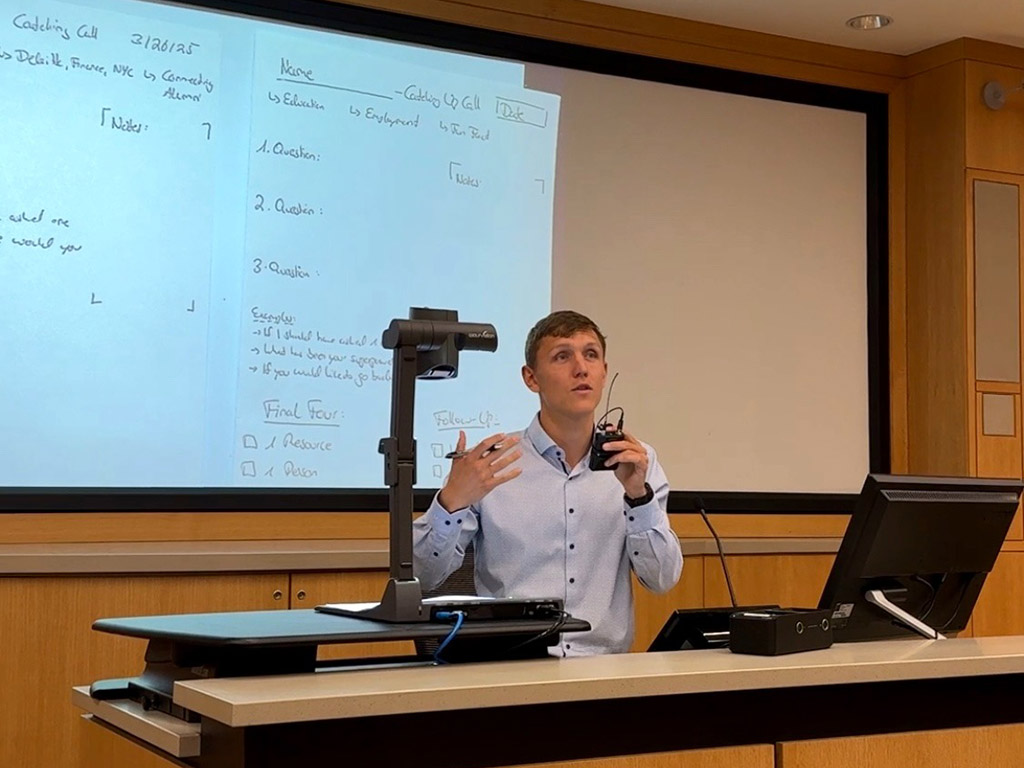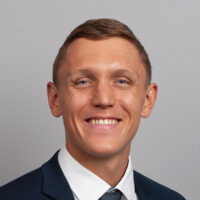Duke MMS Student Blog

The Goal-Setting Philosophy That Shaped My MMS Experience
I knew I could load my plate with school, activities, and so much more; I needed to be intentional about how I spent my short time at Duke.

Reflecting on my time at Fuqua, I’m filled with gratitude for this amazing journey, the meaningful relationships I’ve built, and the support that’s led me here today. One thing I learned from my parents is the importance of setting a goal, something that sets life’s direction and simply helps you wake up excitedly in the morning. I’ve carried that lesson with me to Fuqua, and it’s allowed me to appreciate the journey of earning small wins in pursuit of a long-term goal.
One week before joining the MMS program, I asked myself what I wanted to get out of this experience. I knew I could load my plate with school, activities, and so much more; I needed to be intentional about how I spent my short time at Duke.
Goal #1: Expanding My Network With Authenticity
Channeling my life motto, “Show me your friends, and I’ll show you your future,” I made the goal of personally learning about the people around me and making the most of this experience. When I stepped my first foot into the Fuqua building, I barely knew my admissions counselors’ name. It was a little bit nerve-racking initially but now, months later, makes me smile as I am not even walking across the hall without seeing familiar faces.
By surrounding myself with friends and classmates with similar goals, I can hold myself accountable. This isn’t just about academics, but having a friend who says, “Hey, do you want to grab a coffee?” pulling me out of my routine and allowing me to be present. I’ve been incredibly blessed to find those friends in MMS. They’ve helped me become a better version of myself.
Goal #2: Do Something Interesting Every Day
Bob Salvin, my dear friend and mentor at my alma mater, Queens University of Charlotte, told me that one of the most fulfilling goals is to do something interesting or learn something new every day. I’ve taken this idea to heart at Fuqua by pushing myself toward experiences that enrich my daily life as a student.
Unsure of what opportunities I’d find, I connected with Matt Palmer, a mutual friend with Duke Athletics, sharing with them my interest in doing something interesting every day. One connection to another, and I eventually secured an exciting role working with Duke corporate partnerships.
Even then, I wasn’t sure what I had gotten myself into, but it turned out to be a perfect fit. I had many shifting responsibilities, from meeting and welcoming interesting people at sports receptions to supporting basketball or football event operations. The highlight was being in Cameron Indoor Stadium as the Duke men’s basketball team faced arch-rival UNC, a legendary experience for any Blue Devil.
Setting a goal of doing something interesting every day was the catalyst for stumbling into some very unique experiences, and I’m endlessly grateful for the opportunities I’ve discovered.

Goal #3: Embrace My Transition from Professional Athletics
Entering the MMS program, I was committed to embracing the transition from being a professional athlete to pursuing other ambitions. My dad often shares this famous quote: “It is impossible to write the next chapter of life if you keep re-reading the past one.”
Swimming professionally had been one of my main priorities for most of my life. I knew that it would be challenging and, at times, uncomfortable to embrace this new chapter. I had to get comfortable with being uncomfortable, which came in the form of saying yes to new opportunities.
Character, excellence, discipline, resilience — these are all values that directly connect to my time as an athlete but have shaped my transition as well. I took on the role of Admissions Ambassador and helped plan Blue Devil Experience, a weekend of events designed to help admitted students experience life at Fuqua before deciding to enroll. I had never done anything like that before, but I knew part of this experience would involve taking on responsibilities that are totally new to me.
Also, I completed my first marathon. When I first started training, I was exhausted after 15 minutes of running. Leaning on the support of friends and classmates like Henry Probst and Krew Verratti, I set small goals and made incremental progress. Running a marathon was not a goal I had envisioned when I started the MMS program, but it became an outlet for trying to achieve something new.

Practical Tips for Tracking Goals
Throughout the past couple of years — shoutout to my former coach, Jeff Dugdale, for his influential guidance — I’ve learned that a goal isn’t as impactful if I’m not tracking, measuring, and celebrating what I achieved. Here are three practical guidelines I follow to make sure I’m not getting lost in the process towards my goals.
- Write the goal on paper. This might seem simple, but having a physical reminder of your goal is so important for staying focused and motivated. I hung my goals above my bed, but other useful places might be on your desk, near your front door, or on your mirror.
- Share your goals with people you trust. These people may be able to give you feedback on your goals or encourage you along the way. They may even join you or help you hold yourself accountable in achieving what you set out to do.
- Set process goals. Breaking down big, lofty goals into smaller goals helps with motivation. For instance, without process goals, I might have been discouraged by my exhaustion after running for 15 minutes in my marathon training sessions. Instead, I set benchmarks so I could see and celebrate my progress.
My goal-setting philosophy has impacted me far more than giving me a list of things I’ve achieved. The ultimate rewards are the meaningful relationships I’ve built, the memories I’ve shared, and especially, the feeling of walking at graduation knowing that I’ve leveraged all the resources at my disposal.



